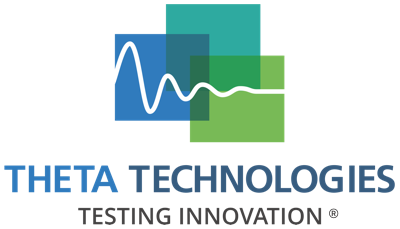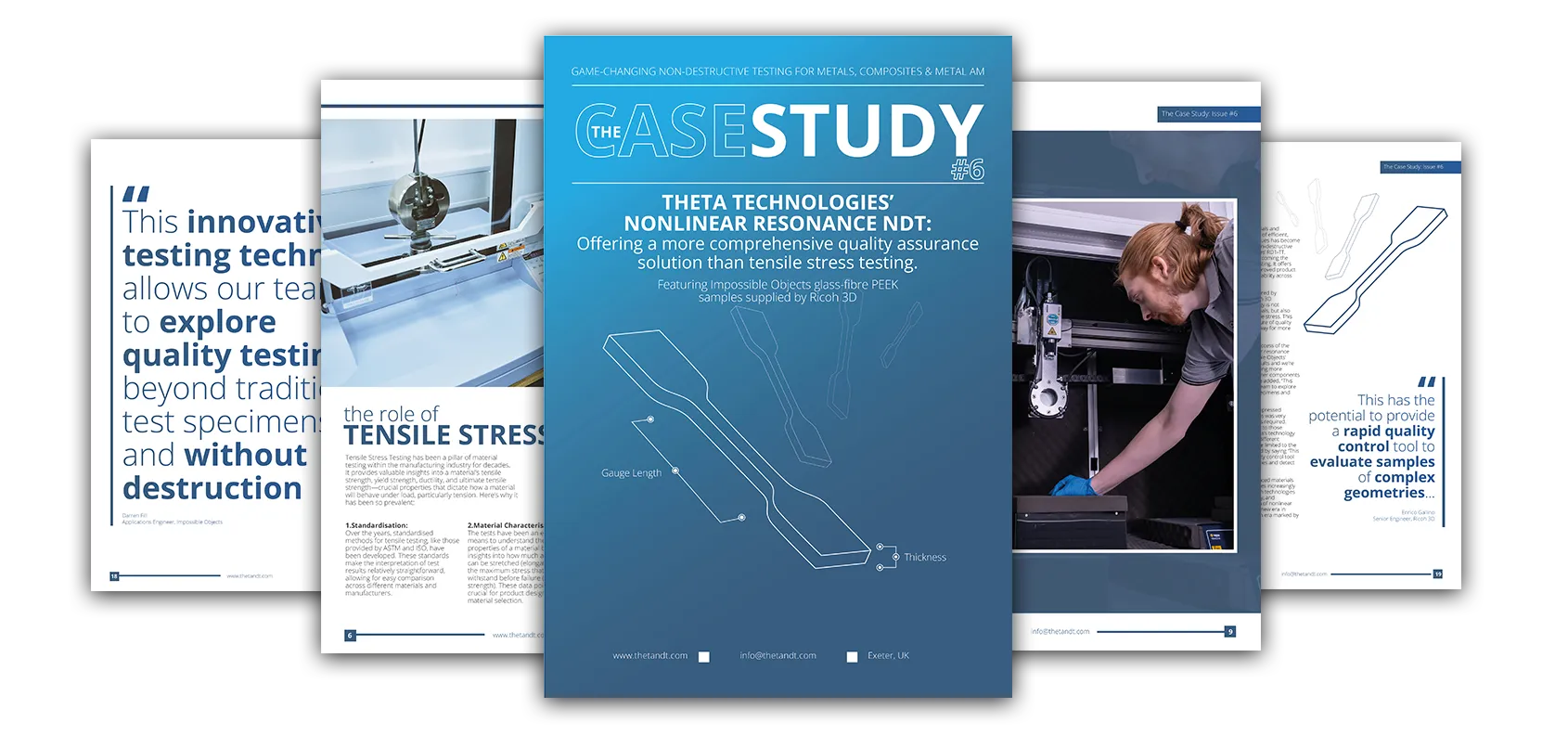
Non-destructive testing case study: Offering a more comprehensive quality assurance solution than tensile stress testing.
Theta Technologies’ nonlinear resonance NDT solution is revolutionising material testing ensuring integrity and performance for advanced materials like PEEK.
Tensile stress testing has been a pillar of material testing, but is it time to embrace something new?
In the world of material testing, there has been a continuous quest to find reliable alternatives to conventional, destructive tensile stress testing. This quest has led to the evolution of non-destructive testing (NDT) techniques, which have now matured into viable solutions for an increasing number of applications. One such solution is nonlinear resonance, a revolutionary technique brought to you by UK-based Theta Technologies, and one that has all the credentials to challenge the status quo.
Could this technique provide an effective alternative to the go-to tensile stress test?
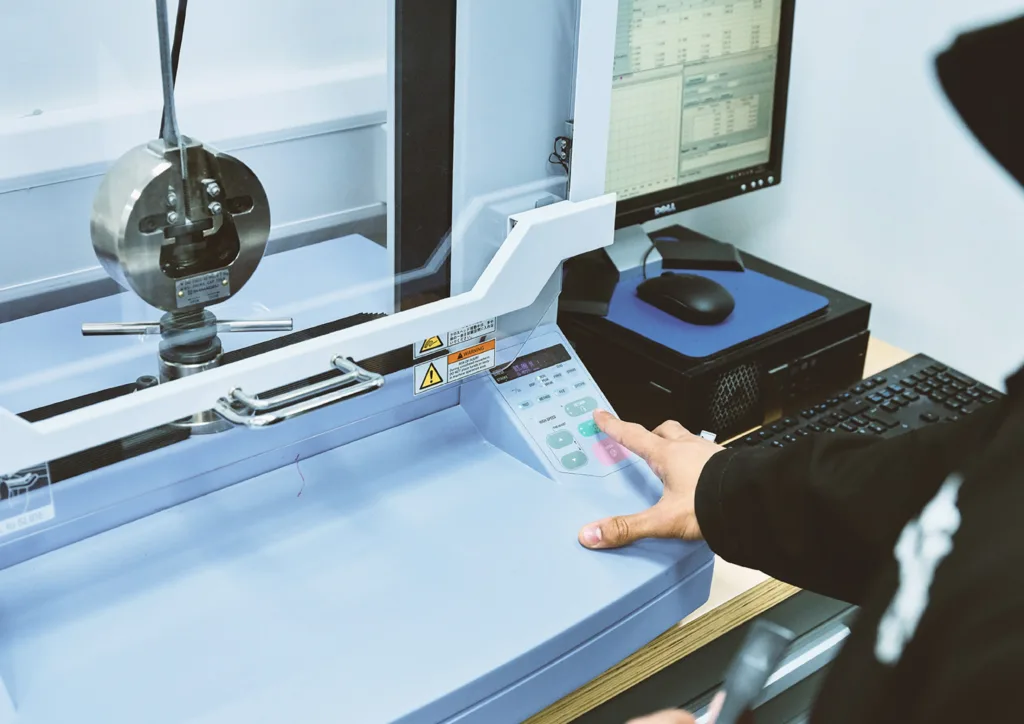
The role of tensile stress testing.
Tensile Stress Testing has been a pillar of material testing within the manufacturing industry for decades. It provides valuable insights into a material’s tensile strength, yield strength, ductility, and ultimate tensile strength—crucial properties that dictate how a material will behave under load, particularly tension. Here’s why it has been so prevalent:
1. Standardisation:
Over the years, standardised methods for tensile testing, like those provided by ASTM and ISO, have been developed. These standards make the interpretation of test results relatively straightforward, allowing for easy comparison across different materials and manufacturers.
2. Material Characterisation:
The tests have been an effective means to understand the inherent properties of a material by providing insights into how much a material can be stretched (elongation) and the maximum stress that it can withstand before failure (tensile strength). These data points are crucial for product design and material selection.
3. Quality Control
Manufacturers have used tensile stress testing as a means of quality control. By testing a sample of a batch, it’s possible to assess if the entire batch meets the required strength and durability standards. This aids in identifying substandard materials before they make it into the production line.
4. Versatility
TST can be used on a wide variety of materials, including metals, polymers, ceramics, and composites. This versatility makes it a one-size-fits-all solution for many industries, including automotive, aerospace, construction, and medical devices.
Has the stress test had its day?
Despite its widespread adoption tensile stress testing is becoming an increasingly ineffective method of quality assurance. The most significant drawback of the tensile stress test is its destructive nature. Once a sample is tested, it’s no longer useful and cannot be retested or reused. This results in material waste and additional costs, particularly when testing expensive materials or components.
Lack of real-time monitoring is also a significant drawback with tests only able to provide a snapshot of a material’s condition at the time of testing. It doesn’t allow for real-time monitoring of a material’s health during its service life. This is a key limitation, particularly in industries where preventive maintenance and early fault detection are crucial.
The very nature of the test also requires specific sample shapes (dog bone or dumbbell) and sizes, which may not always be representative of the actual product or part. Additionally, preparing these samples can be time-consuming and expensive. Even if the technique was able to test beyond specific sample shapes, with the advent of advanced materials and complex, multi-material structures, traditional stress tests can fall short. It may not reveal crucial flaws or give a complete picture of a material’s performance under real-world conditions.
Of course, nowadays you cannot discuss a product without assessing its potential impact on the environment and as sustainability becomes more crucial, the material wastage and energy consumption associated with tensile stress testing are increasingly unfavourable. Businesses are looking for testing methods that are less wasteful and more environmentally friendly.
While tensile stress testing has been widely used in the industry for its simplicity, standardisation, and applicability across a variety of materials, it’s becoming increasingly outdated. Manufacturers are turning towards more innovative methods.
Enter non-destructive testing, a suite of methods that have shown promise in overcoming the limitations of this more traditional technique. As a non-destructive approach, NDT allows manufacturers to assess a component’s integrity without rendering it unusable, providing significant advantages such as reduced material waste, the identification of flawed components prior to use, increased product reliability, and application at multiple stages of the development process.
Among the many available NDT techniques, Theta Technologies’ nonlinear resonance NDT stands out with its superior performance, especially when employed on advanced materials such as Polyether Ether Ketone (PEEK). This revolutionary technique offers a more comprehensive, real-time, and sustainable solution for material testing, identifying flaws and providing predictive insights into a material’s performance – pivotal in today’s rapidly evolving manufacturing landscape.
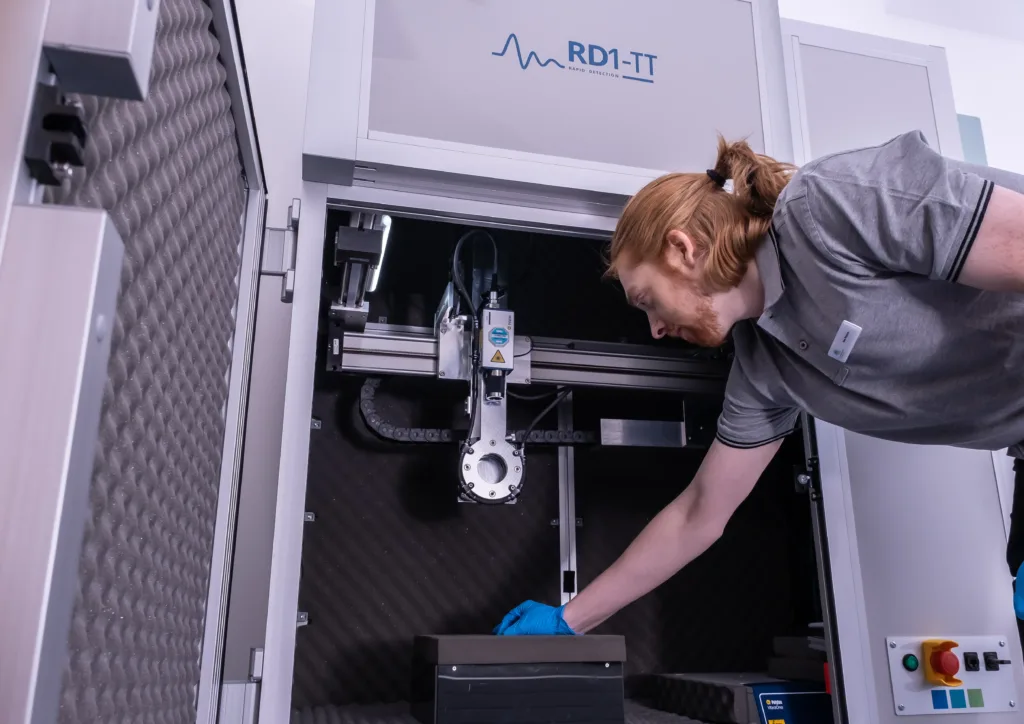
RD1-TT ustilises Theta Technologies’ unique nonlinear resonance non-destructive testing technology.
Nonlinear resonance NDT: A paradigm shift.
Theta Technologies’ Nonlinear Resonance NDT has proved to offer effective solutions for quality assurance in advanced manufacturing, specifically for additive manufacturers and PEEK manufacturers. This cutting-edge technology utilises resonance to reveal microscopic flaws within a component. The technology, now commercially available thanks to RD1-TT, has been tested and validated through extensive case studies. And that’s what we are here to do once again, with a study focused on the application of nonlinear resonance NDT on PEEK samples, manufactured by Impossible Objects and supplied by Ricoh 3D.
Polyether Ether Ketone, more commonly known as PEEK, is well known for its extensive use within manufacturing for a plethora of demanding applications, largely due to its high-performance credentials and unparalleled print ability. From piston units to critical engine parts, PEEK’s mechanical performance, lubrication properties, and ability to perform across a wide range of temperatures solidifies its place as the preferred material for use in industries such as automotive, aerospace, healthcare, and electrical.
Unlike other plastic and polymer materials commonly used in 3D printing, PEEK has a much higher strength and stiffness, properties that are more than ideal for the performance of a nonlinear resonance non-destructive test. This revolutionary NDT technique excites a component into resonance to exploit the microscopic behaviours of flaws within. This novel method has already proven its credentials when testing conventional metals, metal AM, and composite parts, but could nonlinear resonance NDT detect flaws in the glass-filled PEEK samples supplied by Ricoh 3D?
Case Study: The Proof
Nonlinear resonance NDT: A cost-effective alternative to tensile stress testing?
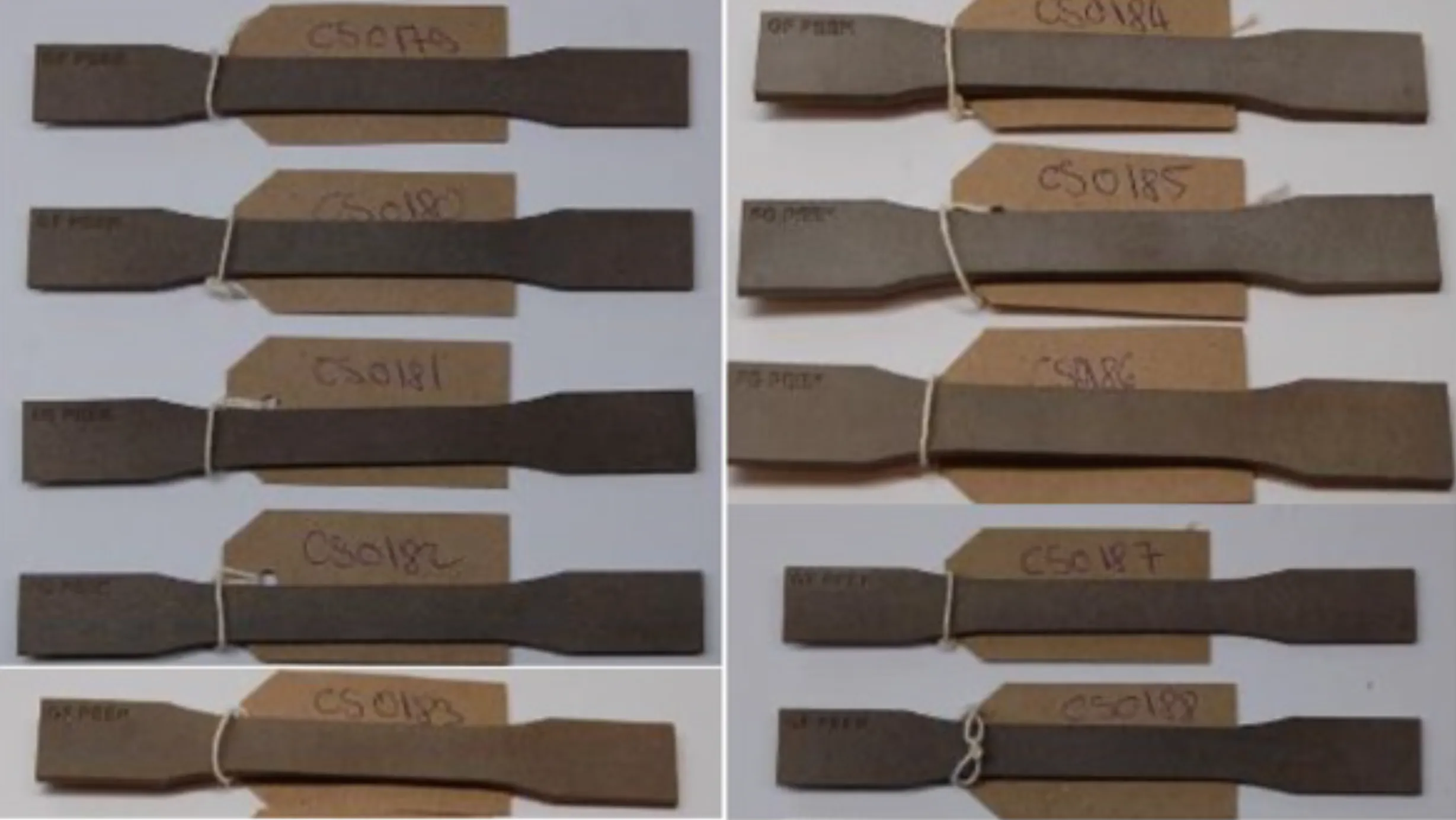
IMAGE: The dog bone samples produced by Impossible Objects to be subjected to the non-destructive test.
Impossible Objects, the manufacturers of the dog bone samples used as part of the study, were keen to investigate the potential of nonlinear resonance NDT technique for composite-based additive manufacturing (CBAM). Darren Fill, Applications Engineer at Impossible Objects stated that “The Impossible Objects team were excited to use Theta’s non-destructive testing method to expand upon the insights found using traditional tensile stress testing”.
Enrico Gallino, Senior Engineer at Ricoh 3D, who supplied the samples to Theta Technologies added “The aim of the project was to have a better understanding of the capabilities of the Theta Technologies’ nonlinear resonance NDT technology, and if it would be possible to detect flaws in additive manufactured composite parts. I was confident that the technology would deliver some results based on previous tests from Theta in composite metal parts”.
Phase 1.
The study was divided into three phases in order to validate nonlinear resonance, either as an alternative to the traditional tensile stress test or a complementary measure. During Phase 1, several dog bone samples were subjected to blind non-destructive tests using Theta Technologies’ RD1-TT unit, without any prior indication of the sample’s individual condition to avoid influencing the results. Instead, the samples were labeled using Theta Technologies’ marked IDs (Fig A).
Upon an initial visual inspection, the samples supplied were identified as having an array of surface finishes, resulting in 1-2mm thickness variation across the range. Some geometrical differences were also noted prior to the tests.
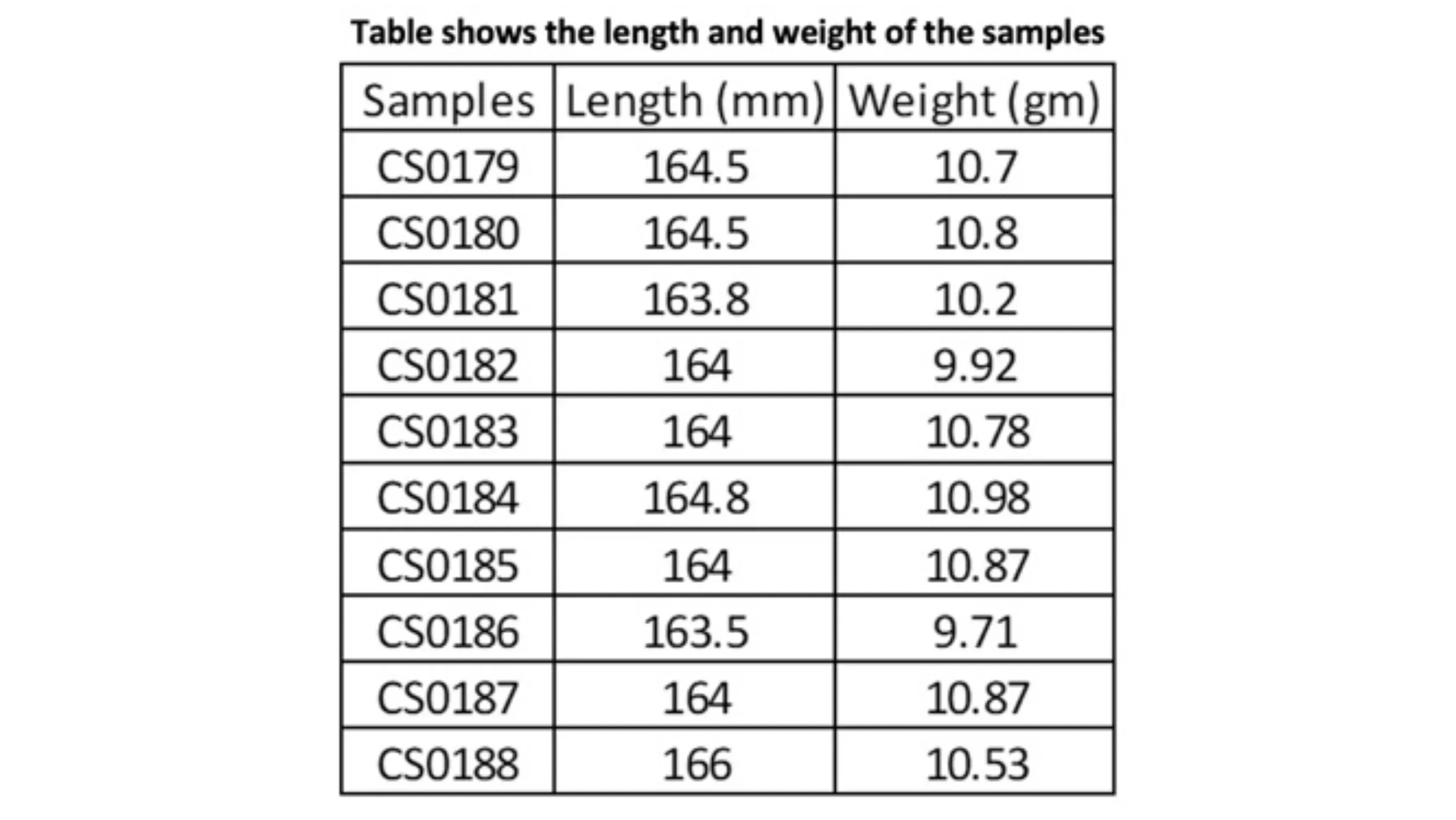
Fig A. Theta Technologies marked ID system for the categorisation of the dog bone samples.
How does nonlinear resonance NDT work?
Samples are excited into various resonant modes of vibration and a laser vibrometer is used to detect signs of nonlinearity within. A nonlinear response would indicate that the component is flawed. This technique offers some notable advantages for volume manufacturers seeking a rapid triaging solution and can be deployed at multiple stages of the production workflow to monitor the integrity of parts. As RD1-TT performs much more rapid tests than other NDT methods, it can be used earlier in the manufacturing process to identify design or production issues or to test components immediately after fabrication.
The benefits of nonlinear resonance NDT
Theta Technologies’ nonlinear resonance NDT offers an impressive portfolio of benefits to manufacturers. Some of the main advantages over other NDT methods include:
1. An ability to test for flaws that compromise the structural integrity of components – flaws that other NDT methods are unable to detect.
2. Rapid testing (under one minute)
3. Can test parts with increasingly complex geometries
4. Capable of testing additive-manufactured parts with rough surface finishes
5. User-friendly operation with limited training required.
6. Speed and versatility to enable mass manufacture.
To validate the effectiveness of the nonlinear resonance test results in this study, five repeatability and three reproducibility tests were performed for each of the supplied dog bone samples. The results are then represented using a ‘damage index’ which identifies the extent of any flaws present within the components under test.
Although the primary objective of the test is to obtain nonlinear measurements to reveal potentially detrimental flaws, additional measurements are obtained as a by-product of the procedure. A variation in the measurements between the samples revealed in the additional data indicates that the parts have differing dimensions or material properties; information that proves particularly beneficial for manufacturers who have limited tolerance for the changes in size and shape of their products. RD1-TT therefore provides a quality assurance solution that moves beyond flaw detection.
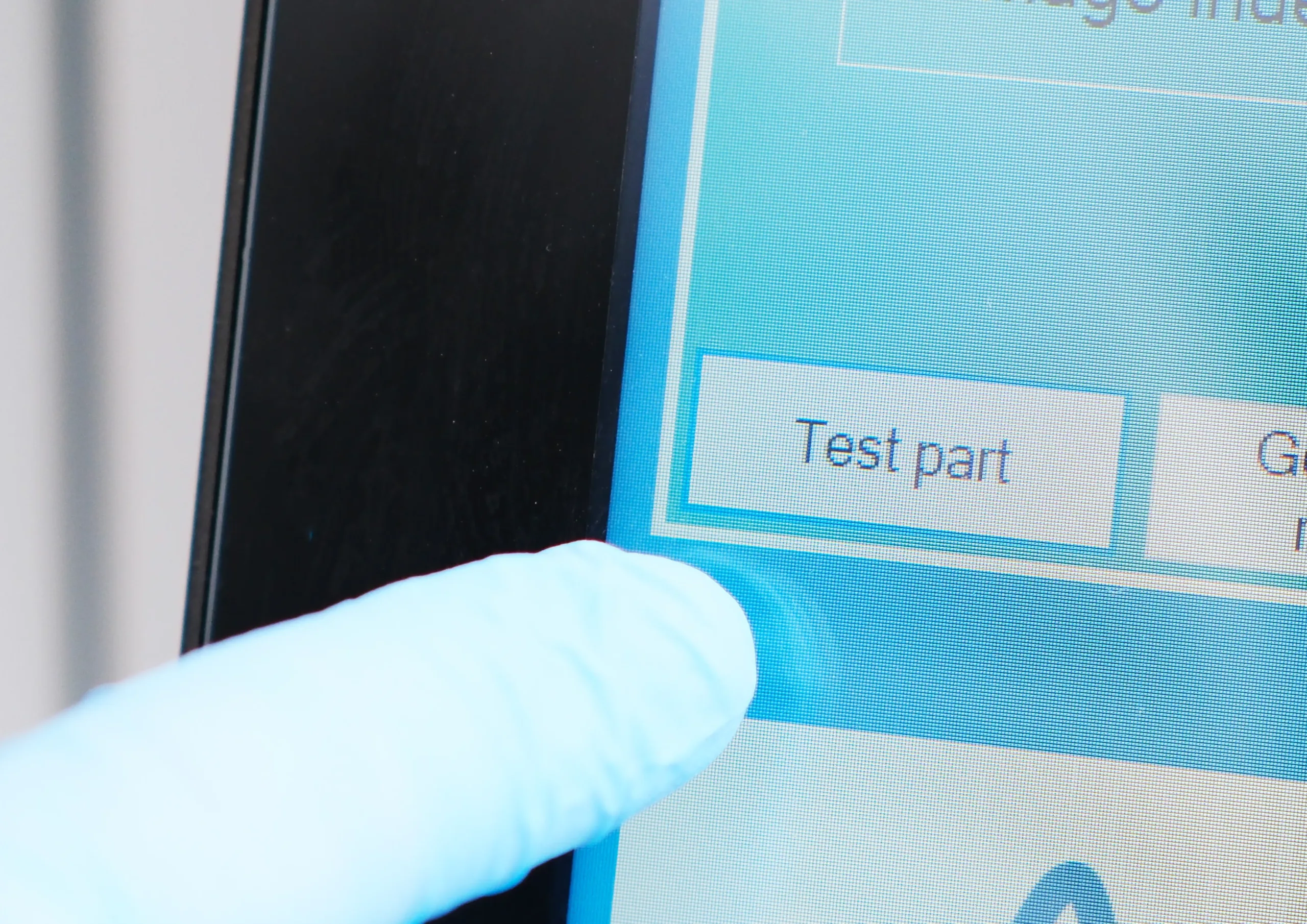
Nonlinear resonance NDT: More than just flaw detection.
Both the material properties data (Fig B) and nonlinear measurements (Fig C) revealed clear differentiation between the ten samples. Samples CSO0183 and Samples CSO0184 registered the highest on the damage index and also showed clear differentiation in the linear measurements due to the presence of delamination and thickness non-uniformity (Image).
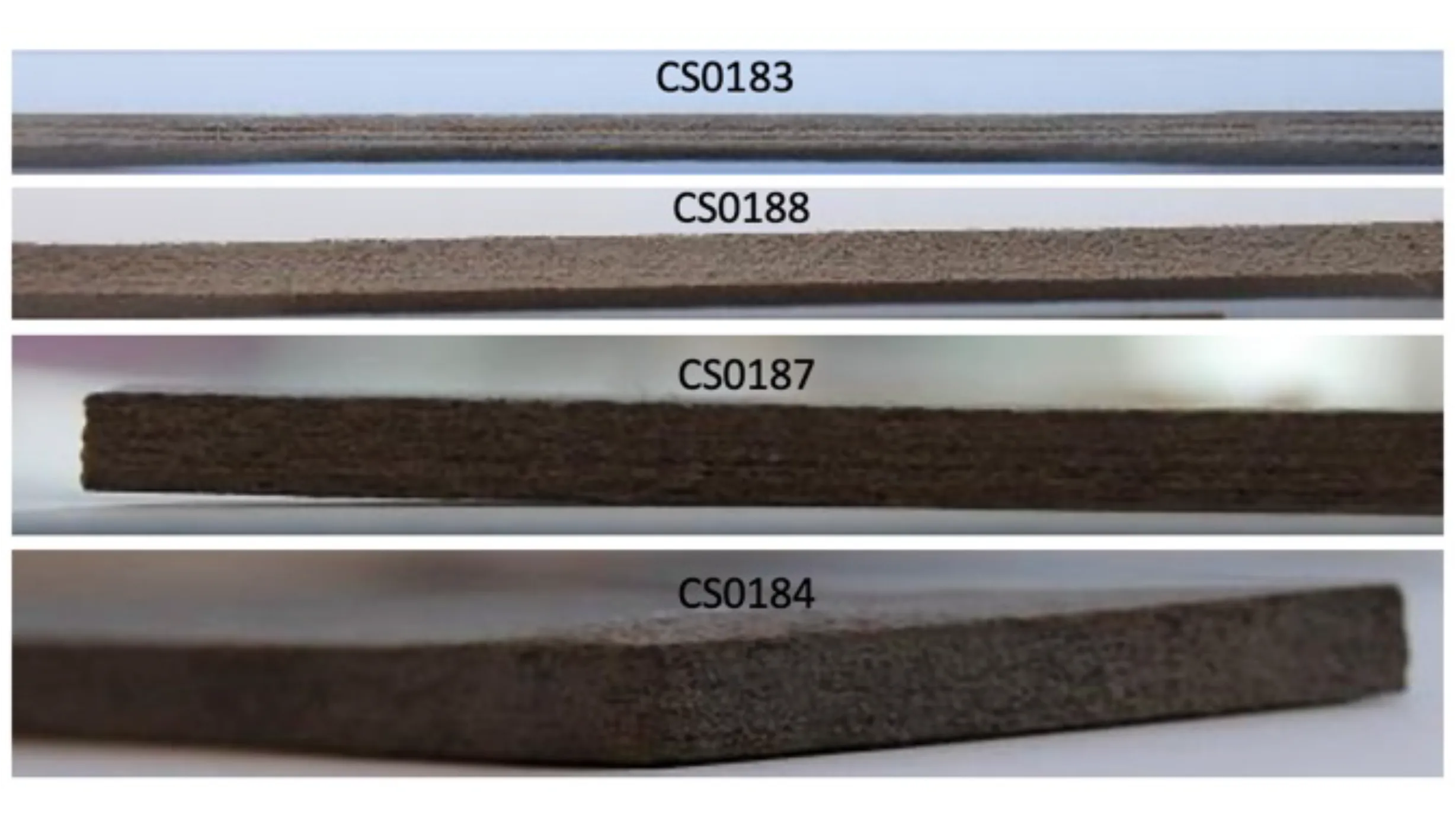
IMAGE: Evidence of thickness variations and delamination in the samples provided.
Theta Technologies’ RD1-TT had not only been able to identify the presence of flaws within the glass-fibre PEEK samples provided by Ricoh 3D, but it had also highlighted clear differentiation in the material properties of the samples. Was this enough to prove nonlinear resonance NDT’s value when compared to the traditional tensile test method?
To validate the results, the parts would be returned to Ricoh 3D where a comparative study with the tried and tested tensile stress test would be performed. The nonlinear test results obtained by Theta Technologies during phase one would be used to predict which samples would fail first when subjected to the rigours of these tests.
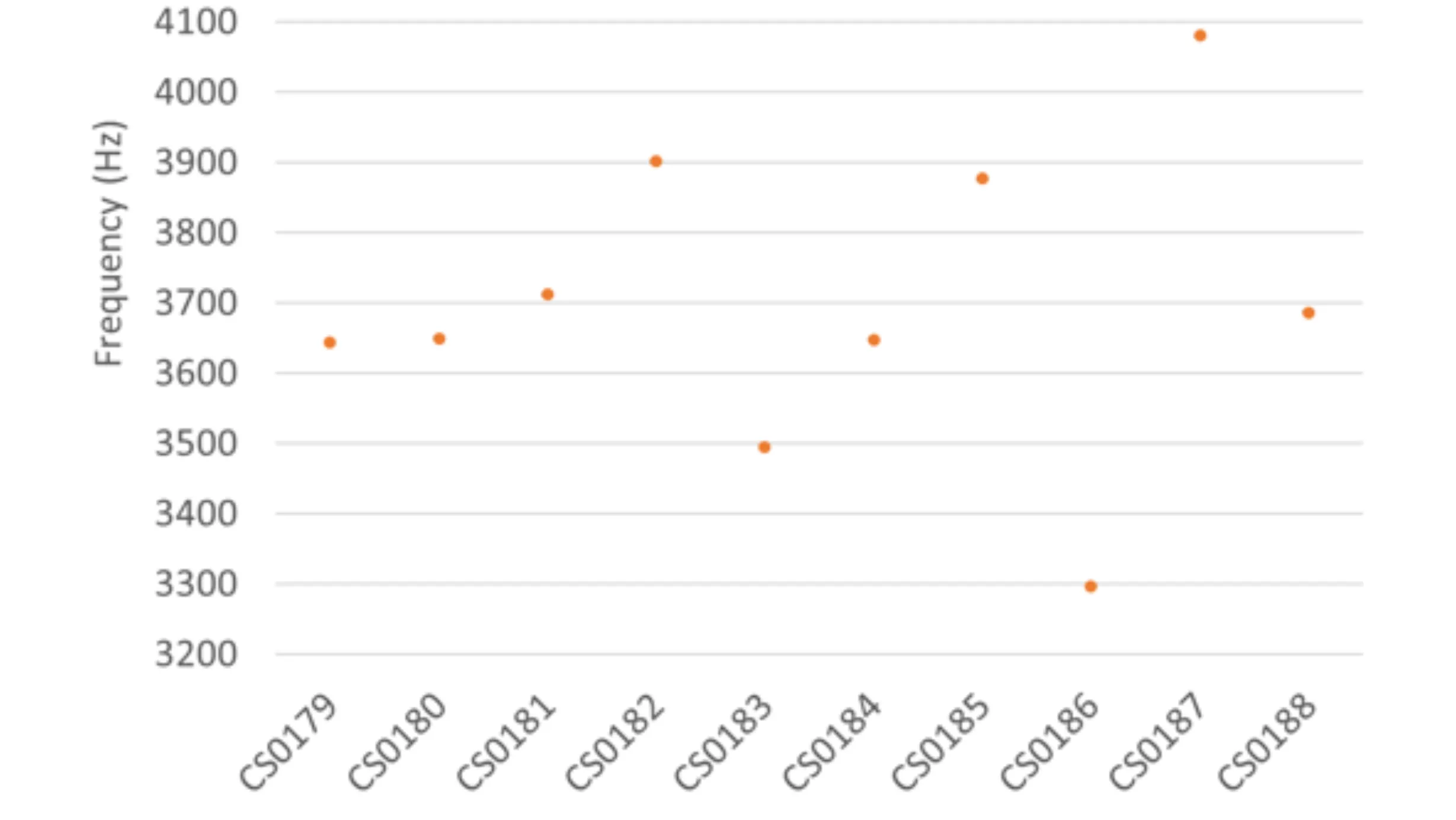
Fig B: Material properties data
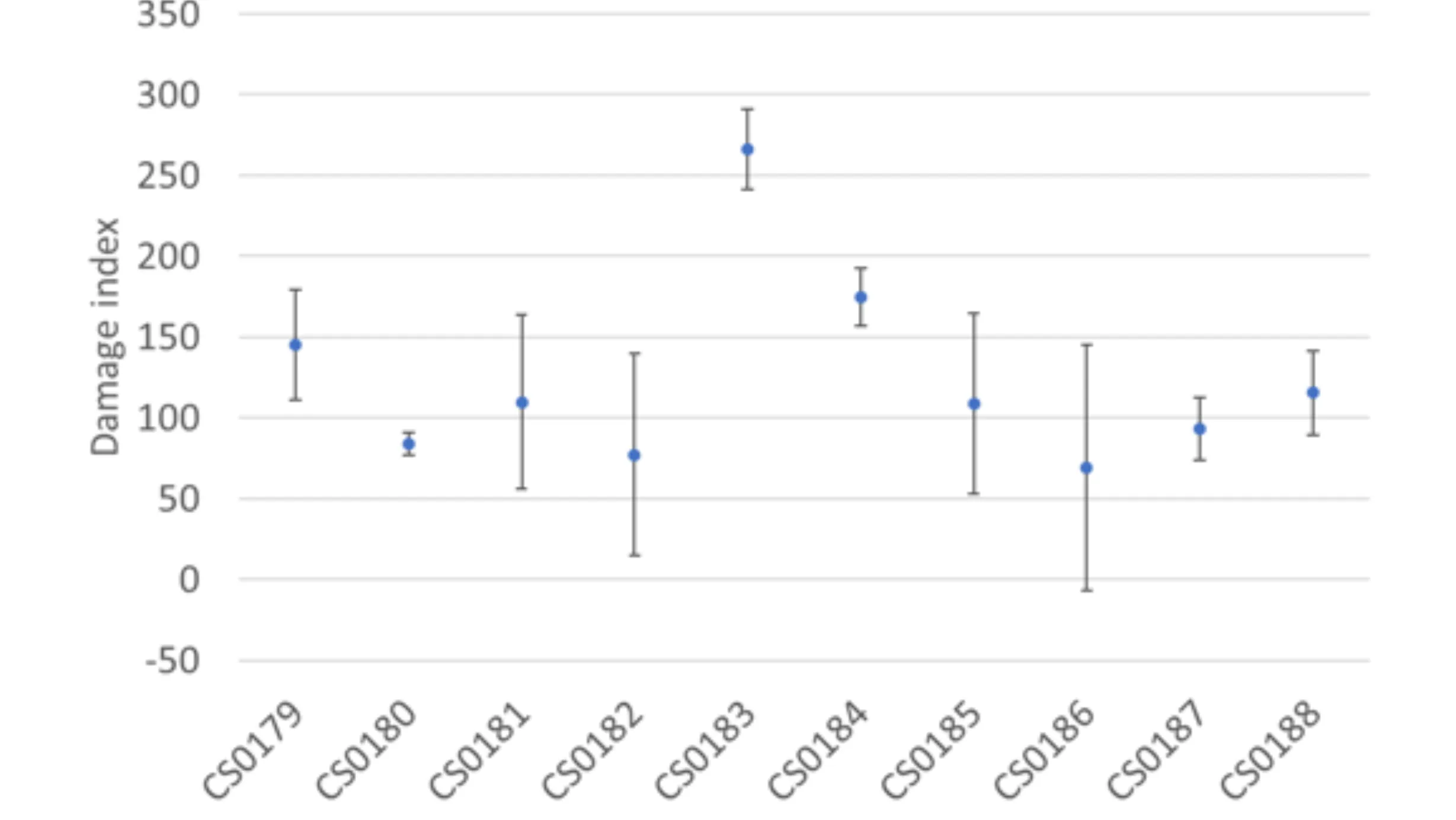
Fig C: Nonlinear damage index
Phase 2: Tensile Stress Tests: Could nonlinear resonance predict the outcome?
Additional tensile stress tests were performed by Ricoh 3D to validate the findings of the non-destructive tests. It was anticipated that the samples identified with higher damage indexes, as determined by RD1-TT, would fail sooner under the extreme pressures of the tensile stress test.
“
We didn’t know if the samples tested contained any defects…
The results of the tensile stress tests correlated strongly with the NDT results, plotted in Fig D, validating the effectiveness of the technology in predicting component failure. Sample CS00183, which registered the highest damage index during the non-destructive tests performed by Theta Technologies, failed much earlier under tensile stress testing.
Enrico commented, “We didn’t know if the samples tested contained any defects as it was a blind test, so it was good to see that the technology was able to establish a correlation between the damage index and the maximum strain results of the tensile tests.”
The study’s results provided clear validation for the effectiveness of Theta Technologies’ nonlinear resonance NDT in flaw detection within glass-fibre PEEK samples. Not only could the technology identify the presence of flaws, but it also highlighted clear differentiation in the material properties of the samples.
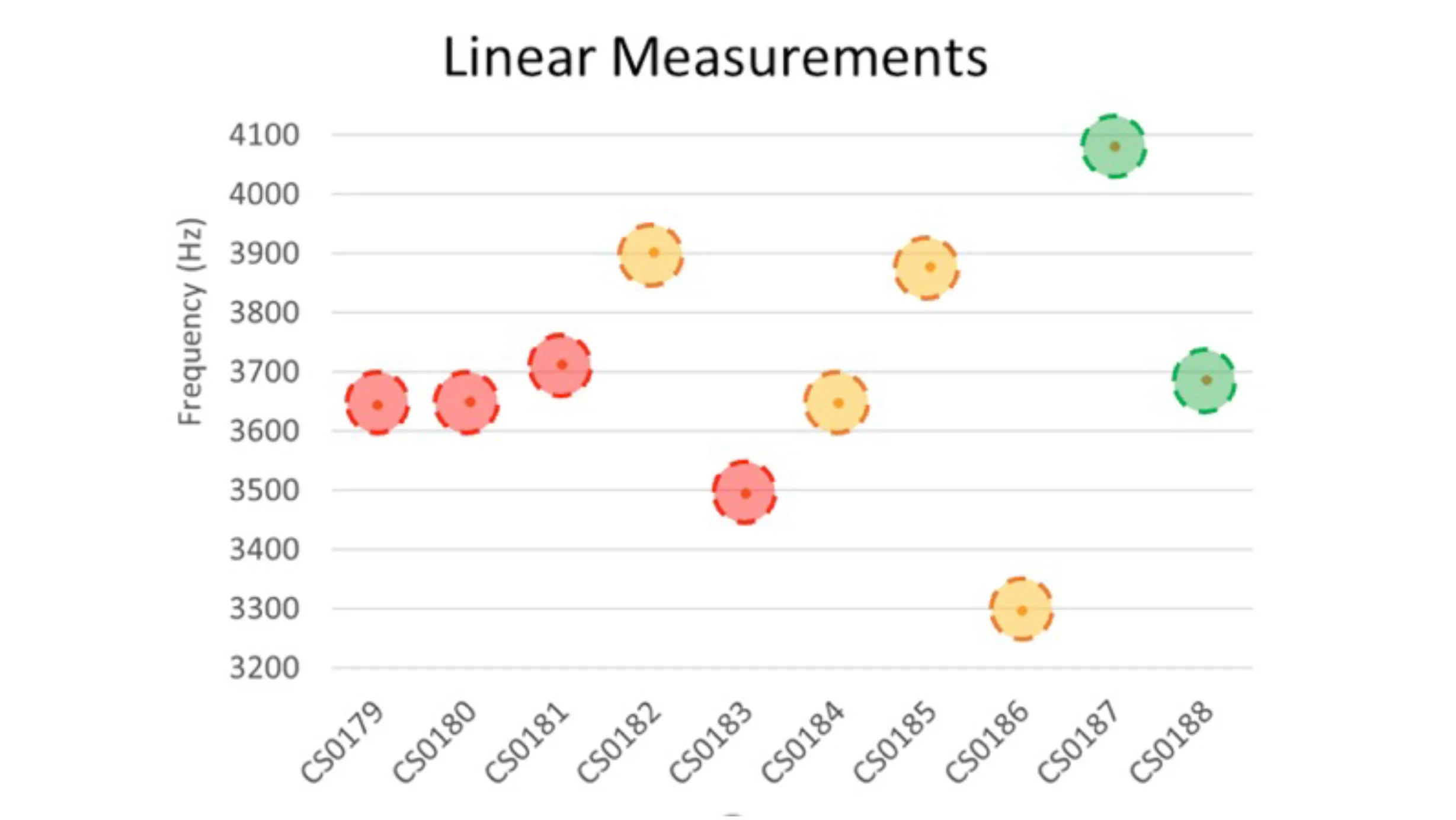
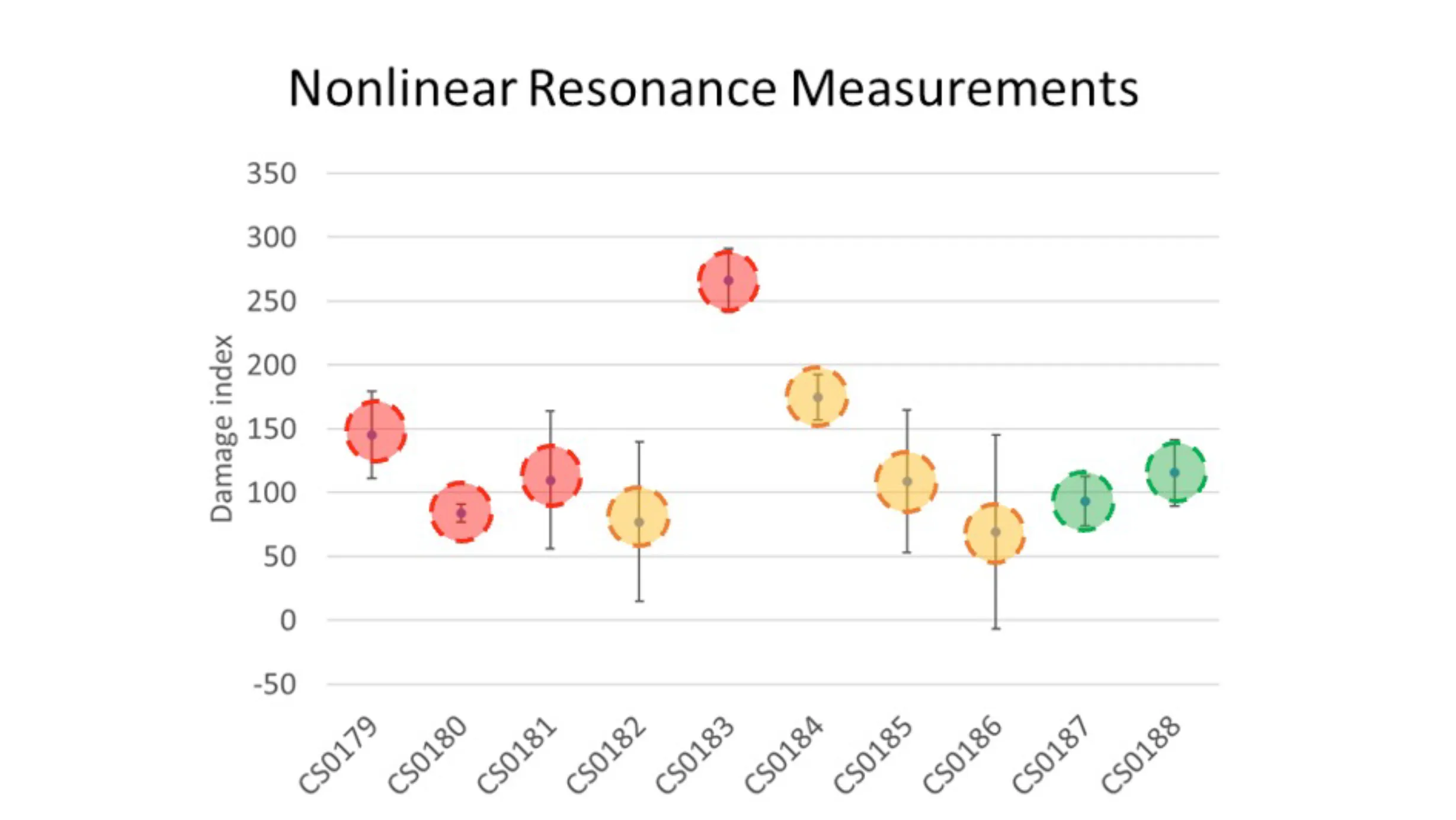
Fig D. The initial linear and nonlinear measurements plotted in conjunction with the second phase of tensile stress testing
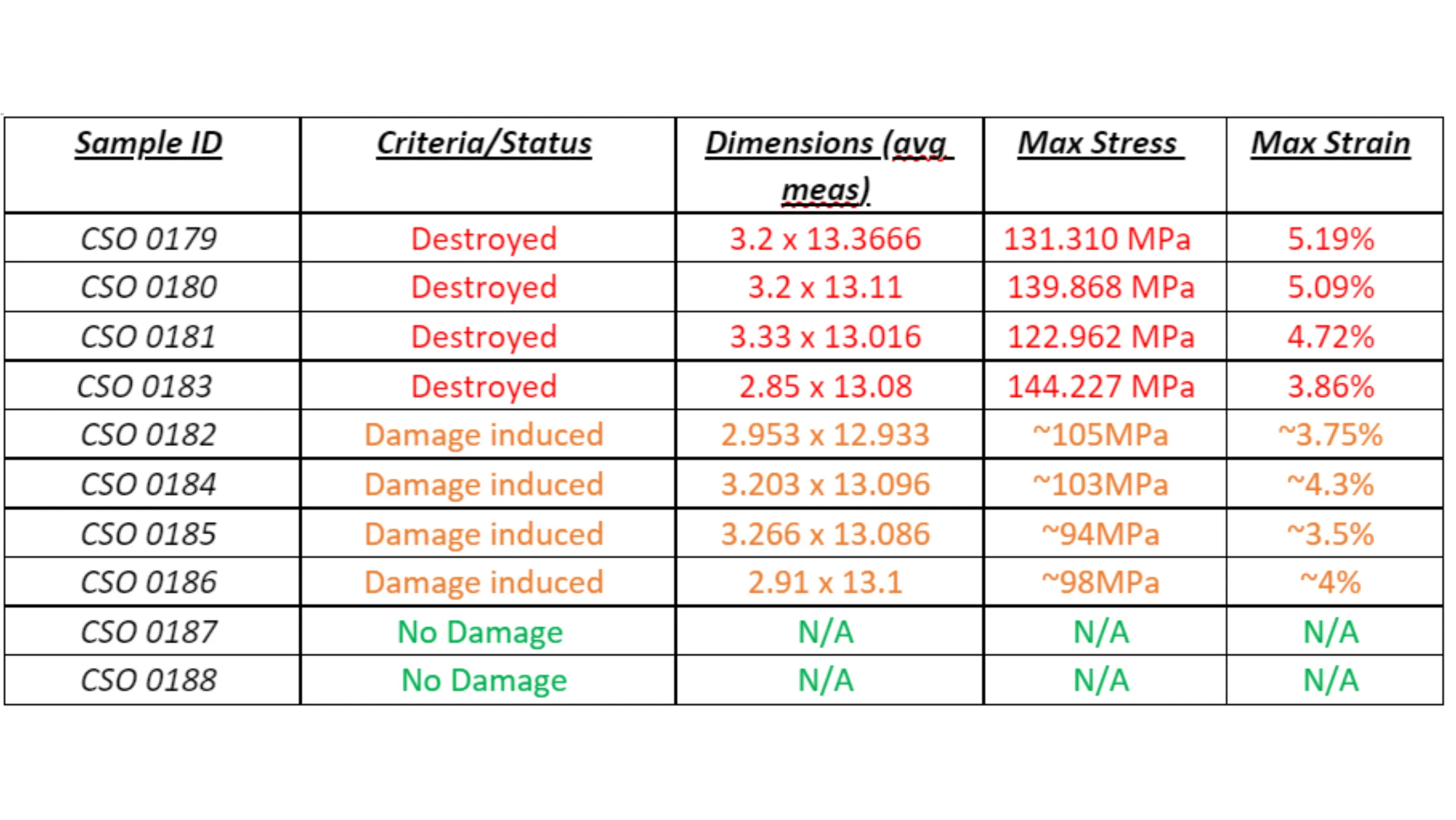
Phase 3: Further validation of NLR
The samples subjected to the destructive tests of the tensile machine, albeit not to complete destruction, were once again returned to Theta Technologies for a second round of non-destructive tests in order to provide a comprehensive comparison of NLR results, both before and after tensile stress was applied. The objective this time was to determine whether nonlinear resonance could differentiate between the samples that were subjected to varying stress levels.
Numerous predictions were made prior to performing the second nonlinear resonance non-destructive tests:
1. The damage index would increase for all samples
2. Expected linear frequency changes
3. The samples subjected to the higher strain will result in a higher damage index measurement
RD1-TT was once again utilised to perform the non-destructive tests on the dog bone samples and as anticipated, there was clear correlation between the nonlinear resonance results and the tensile stress test (Fig F).
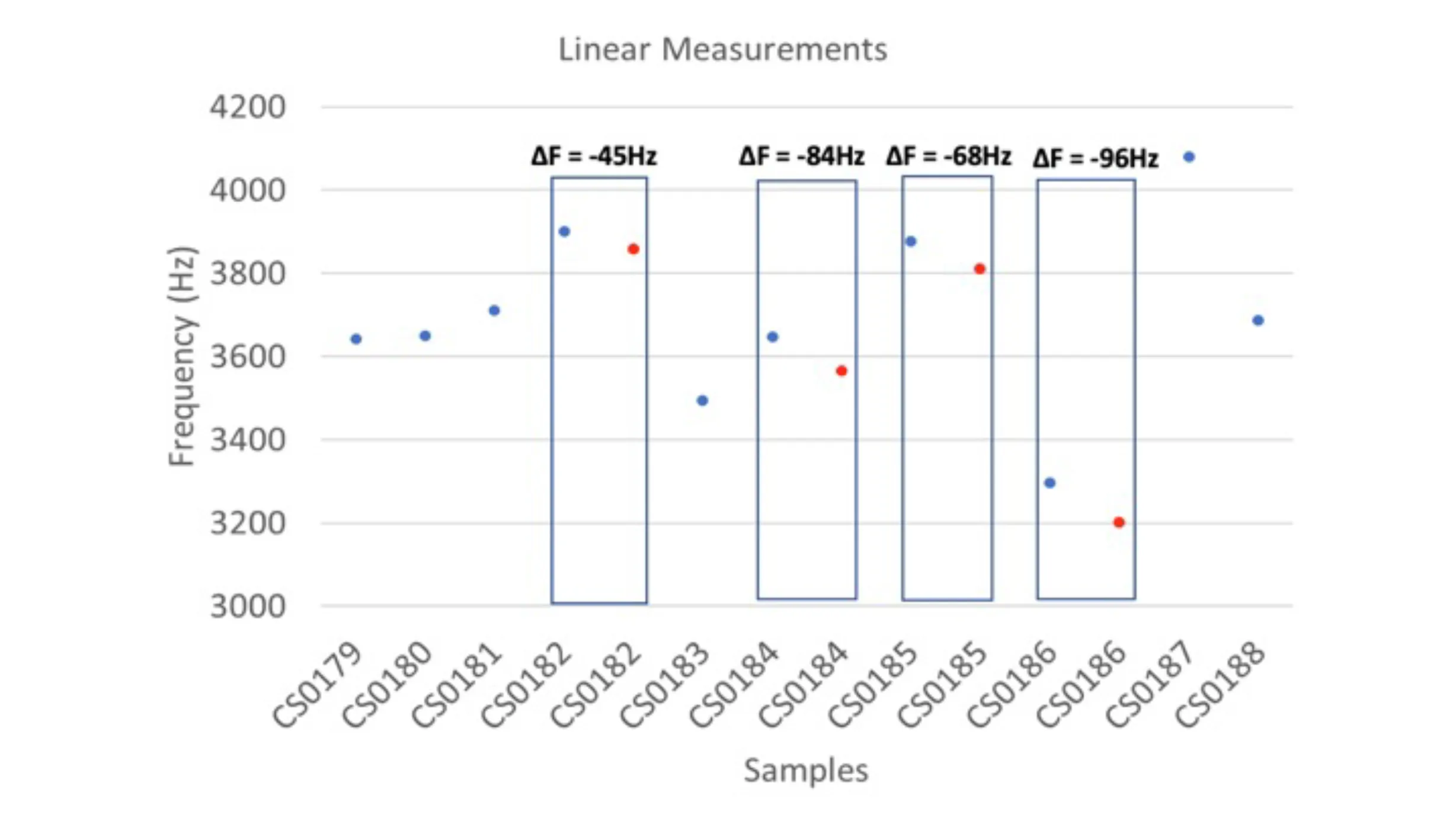
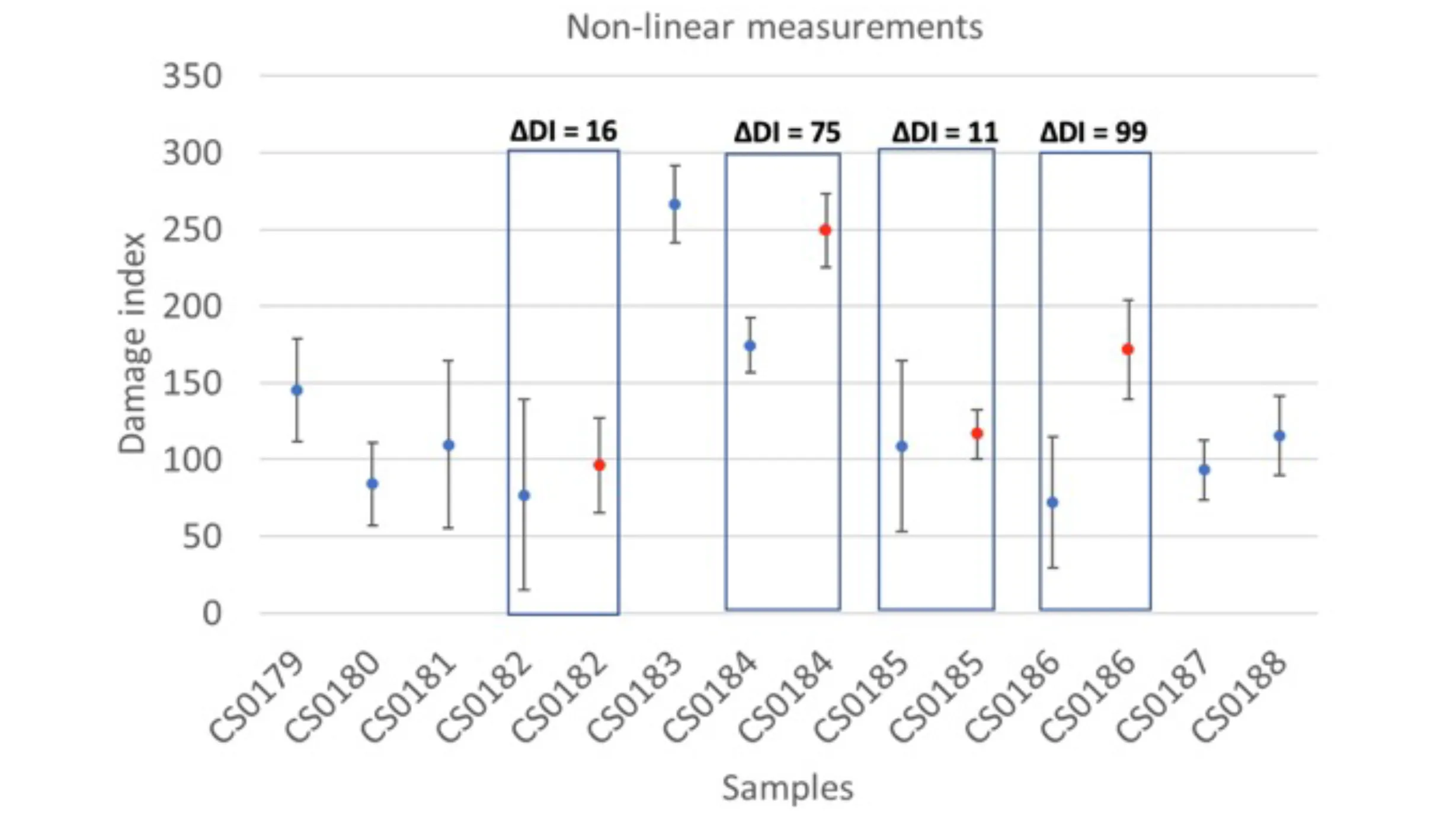
Fig F. The changes to the linear and nonlinear results after the tensile stress test had induced damage on the dog bone samples.
The benefits of non-destructive testing over tensile stress testing
There is compelling evidence from this study that highlights the many benefits of nonlinear resonance NDT, which underline its potential as a more effective alternative to destructive methods like tensile stress testing:
Material Savings:
Unlike Tensile stress testing, which destroys the sample, nonlinear resonance NDT allows for repeated testing on the same sample, reducing material waste.
Early Fault Detection:
With its ability to identify flaws early in the production process, manufacturers can quickly rectify any production issues, saving significant resources.
Increased Product Reliability:
The in-depth material analysis offered by nonlinear resonance NDT can lead to a better understanding of a component’s properties, resulting in increased product reliability.
Predictive Capabilities:
The study showcased that Theta Technologies’ nonlinear resonance can not only detect flaws, but also predict the longevity of tested parts. Such predictive capabilities are of immense value in manufacturing, aiding in design improvements, material selection, and preventive maintenance.
Reduced Testing Time:
Tensile stress tests can be a time-consuming process. In contrast, Theta Technologies’ nonlinear resonance solution has proven to be faster and more efficient, enabling quicker detection and rectification of faults.
Scalability:
The nonlinear resonance technique can be applied to a wide array of materials beyond PEEK, making it highly versatile and scalable for various industries.
“
This innovative testing technique allows our team to explore quality testing beyond the traditional test specimens and without destruction
Darren Fill | Applications Engineer, Impossible Objects
The conclusion
With continuous advancements in materials and manufacturing methods, the importance of efficient, effective, and sustainable testing techniques has become more prevalent. Nonlinear resonance non-destructive testing, exemplified by Theta Technologies’ RD1-TT, has highlighted conclusive results in overcoming the limitations of traditional tensile stress testing. It offers significant material and time savings, improved product reliability, predictive capabilities, and scalability across different materials and industries.
The case study on PEEK parts manufactured by Impossible Objects and supplied by Ricoh 3D demonstrated that this unique technology is not only capable of identifying flaws in materials, but also predictive of their behaviour under tensile stress. This has the potential to revolutionise the future of quality assurance in manufacturing, paving the way for more robust and reliable products.
When asked for final comment on the success of the study, Darren commented “The nonlinear resonance NDT results clearly aligned with Impossible Objects’ internal and third-party tensile stress results and we’re most excited about the possibility of testing more complex geometry, and qualifying customer components without the need for reference parts”. He added, “This innovative testing technique allows our team to explore quality testing beyond traditional test specimens and without destruction.”
“
This has the potential to provide a rapid quality control tool to evaluate samples of complex geometries…
Enrico Gallino | Senior Engineer, Ricoh 3D
Enrico Gallino of Ricoh 3D was equally impressed with the results of the study. “The process was very straightforward and little preparation was required. The results obtained are complementary to those obtained with tensile tests although Theta’s technology has the benefit of being able to analyse different complex geometries. The tensile tests are limited to the conventional tension rods.” He concluded by saying “This has the potential to provide a rapid quality control tool to evaluate samples of complex geometries and detect defects in components”.
As we move forward into an era of advanced materials and manufacturing techniques, it becomes increasingly essential to leverage the potential of such technologies for better quality control, improved safety, and overall product longevity. The application of nonlinear resonance NDT illustrates the dawn of a new era in quality assurance and material testing, an era marked by sustainability, efficiency, and innovation.
learn more
Find out more about this revolutionary NDT technology from the team that built it.
Theta Technologies Limited

Address
Theta Technologies Limited
3 Babbage Way
Exeter Science Park
Clyst Honiton
Exeter
EX5 2FN
United Kingdom
Terms & Conditions Privacy & Cookie Policy Anti-Slavery Policy © Theta Technologies. 2023
